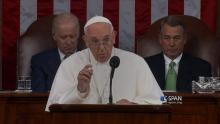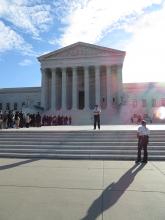capital punishment

The color of your skin shouldn’t determine whether you live or die. But that is precisely the case for Duane Buck, a Texas man facing execution. His case is before the Supreme Court this month.

After his Sunday Angelus prayer, Pope Francis turned his attention to capital punishment — and the overall treatment of prisoners in general — calling on all Christians to work toward abolishing the death penalty. He also asked for government leaders worldwide, and those of Catholic faith, specifically, to halt any executions during this Holy Year of Mercy.

The National Association of Evangelicals, which represents over 45,000 churches from almost 40 different denominations, published a resolution Oct. 19 that substantially revises their position on the death penalty.
The resolution casts serious doubt on the fairness of the U.S. criminal justice system, citing, among other things, the use of DNA evidence in the exonerations of 258 people in the first decade of the 21st century. While levelling a substantial critique of criminal justice in the U.S., the resolution does not call for an end to the death penalty, but instead acknowledges both sides as legitimate positions.

The Atlanta Journal-Constitution reported Tuesday that the pope, back in Rome after a six-day visit to the United States, sent a letter through a representative, Archbishop Carlo Maria Vigano.
“While not wishing to minimize the gravity of the crime for which Ms. Gissendander has been convicted, and while sympathizing with the victims, I nonetheless implore you, in consideration of the reasons that have been expressed to your board, to commute the sentence to one that would better express both justice and mercy,” Vigano wrote.
“In reaching its decision, the Board thoroughly reviewed all information and documents pertaining to the case, including the latest information presented by Gissendaner’s representatives,” a release sent from board chairman Terry Barnard said. No other explanation of the decision was given.

I formerly served as a corrections officer at a maximum security facility. I also used to be a reserve police officer. I have sped through city streets in a squad car, sirens blaring, on my way to shootings. I have booked and interviewed (interrogated) alleged murderers. I have seen victims’ families cry. I have had inmates hit me. I even used force when I wore a badge. And yet, as a Catholic Christian, over the years I have come to oppose capital punishment for a number of reasons.
I agree with Pope Francis’ remarks about the death penalty. During his speech before Congress, Democrats and Republicans applauded when he emphasized: “Let us remember the Golden Rule: ‘Do unto others as you would have them do unto you’” (Mt 7:12). The pope added: “This Rule points us in a clear direction. Let us treat others with the same passion and compassion with which we want to be treated. Let us seek for others the same possibilities which we seek for ourselves. Let us help others to grow, as we would like to be helped ourselves. In a word, if we want security, let us give security; if we want life, let us give life; if we want opportunities, let us provide opportunities. The yardstick we use for others will be the yardstick which time will use for us. The Golden Rule also reminds us of our responsibility to protect and defend human life at every stage of its development.”

THE NATIONAL LATINO Evangelical Coalition announced in March that it would no longer support the death penalty, making it the first U.S. evangelical association to take this stand. Coalition president Gabriel Salguero announced the change at a press conference in Orlando, Fla., and urged NaLEC’s 3,000 member congregations to work toward ending capital punishment nationwide.
“As Christ-followers, we are called to work toward justice for all. And as Latinos, we know too well that justice is not always even-handed,” said Salguero.

Three times in the past month, the Nebraska Legislature voted for a bill to repeal capital punishment and replace it with life without parole. The governor has promised to veto the legislation, and an override vote is looming. Many of the Christian lawmakers made it clear they cast their votes against the death penalty, in part, to promote a whole life ethic.
The leader of the group is Sen. Colby Coash of Lincoln, a Catholic who put his personal reasons for opposing capital punishment into one easily understood phrase.
“I am pro-life,” he said.

Nebraska lawmakers passed a bill May 20 to abolish the death penalty by a big enough margin to override a threatened veto by Gov. Pete Ricketts.
The measure passed 32-15 in the state’s unicameral Legislature. It would replace the death penalty with a sentence of life in prison.
If lawmakers override the expected veto, Nebraska would become the first conservative state to repeal the death penalty since North Dakota in 1973, the Lincoln Journal Star reports.

His guilt is clear. He posted offensive, arrogant messages all over the Internet. He carved a manifesto of revenge into the boat where he hid as police captured him. He flipped a bird at the camera in his jail cell.
The evil he is responsible for is horrific. More than 250 people injured. Seventeen people lost their limbs. Four people died — one of them 8 years old.
It’s no surprise that a jury found him guilty, and still no surprise that they sentenced him to death.
What’s remarkable is the lack of enthusiasm that accompanied Tsarnaev’s death sentence. One person after another had mercy on their lips – from victims of the Boston bombing to the legendary Sr. Helen Prejean who met with Dzhokhar and spoke of his heartfelt remorse.

News reports about the trial and the jury’s deliberations spark fury online. Tempers rise as commenters express their opinions about what they believe should be Tsarnaev’s fate. For example, when the Catholic bishops stood in front of the courthouse expressing their opposition to the death penalty, many responded with outrage: “He should be made to suffer as much as he made others suffer.” “Let him fry.” “Torture him and then kill him.” Similarly, when Bill and Denise Richard, the parents of the 8-year-old boy killed by the explosion, wrote a letter expressing their desire to take the death penalty off the table, their views provoked ire.
What motivates these different perspectives? Is justice about vengeance, an eye for an eye and a tooth for a tooth? Is someone who advocates for life imprisonment soft on crime? Is such a person naïve?

Like many comic book fans, I spent the weekend binging on Daredevil, Marvel’s newest release. The entire first season was created for Netflix, and it dropped in its entirety on Friday. I waited until Saturday night to dig in (longer than some friends of mine), and I was hooked from the opening scene.
It's a scene that opens with Matt Murdock (lawyer-by-day alter ego of the masked vigilante Daredevil) sitting in a confessional. He begins by telling the priest about his father, a boxer who fought harder than his record could ever show. He ends the conversation by asking not for penance, but for future forgiveness — forgiveness for what he’s about to do. “That’s not how this works,” the priest says.
Yet so much of how Murdock as Daredevil works in this latest iteration of the character is how we want it to work. Based closely on Frank Miller’s writing of the character, Daredevil proves to be someone who deals justice unflinchingly. This isn’t someone who hesitates when the situation allows for a grim, overly firm hand. Contrast this with Batman, a character who struggles to commit severe violence even when it seems to be the only option.

A new report by the Equal Justice Initiative documents in horrific detail the nation’s widespread practice of lynching and points to a link between lynching and a practice that persists today: capital punishment.
In the Jim Crow South, lynching declined as officials turned to executions as an alternative method for killing blacks in disproportionate numbers.
This report challenges us to confront our nation’s legacy of racial violence. Sadly, too many Christians were complicit in this violence, which has prompted Christian denominations to apologize and emphasize racial reconciliation. Last week, the Southern Baptist Convention held a two-day race summit in which it urged pastors to do more to diversify their churches.
These are important steps.
But they only mark time if important actions don’t follow.

The National Latino Evangelical Coalition has voted to support repeal of the death penalty, calling it an anti-life practice. Urging their 3,000 congregations to support efforts to end capital punishment across the country, NaLEC joins an increasing number of Christians across the country and internationally who are realizing afresh the moral problems with the death penalty. Most recently Pope Francis went beyond the official teaching of the Roman Catholic Church to call the “death penalty inadmissible, no matter how serious the crime committed.”
“After prayer, reflection, and dialog with anti-death penalty organizations like Equal Justice USA,” said Rev. Gabriel Salguero, president of NaLEC, in a news release. “we felt compelled to add our voice to this important issue. As Christ followers, we are called to work toward justice for all. And as Latinos, we know too well that justice is not always even-handed.”

Only 15 women have been executed in the U.S. since the reinstatement of the death penalty in 1976. For two death penalty cases involving women to make the news in the same week is unprecedented – but it’s happening.
One is Jodi Arias, convicted of killing her ex-boyfriend in 2008, whose sentencing trial was this week. She could face the death penalty in Arizona.
The other is a lesser-known case in Georgia — Kelly Gissendaner, convicted in a 1997 Atlanta murder plot that targeted her husband. Though sentenced to death, it is clear that with a little better legal coaching, Ms. Gissendaner could have plea-bargained for her life. That’s exactly what her husband’s killer, Gregory Owens, did. And now he’s behind bars as she counts down the hours to her death. It just doesn’t feel like your life should depend on how well you play the legal cards, but it sure seems to.
Kelly Gissendaner was supposed to die Wednesday night — but there was an interruption.

The Supreme Court — the last stop for condemned prisoners such as Scott Panetti, a Texan who is mentally ill — and whose case was just stayed by an appellate court — appears increasingly wary of the death penalty.
In May, the justices blocked the execution of a Missouri murderer because his medical condition made it likely that he would suffer from a controversial lethal injection.
Later that month, the court ruled 5-4 that Florida must apply a margin of error to IQ tests, thereby making it harder for states to execute those with borderline intellectual disabilities.
In September, a tipping point on lethal injections was nearly reached when four of the nine justices sought to halt a Missouri prisoner’s execution because of the state’s use of a drug that had resulted in botched executions elsewhere.
And in October, the court stopped the execution of yet another Missouri man over concerns that his lawyers were ineffective and had missed a deadline for an appeal. The justices are deciding whether to hear that case in full.

Pope Francis said Oct. 23 that keeping inmates isolated in maximum security prisons is “a form of torture,” and called life sentences “a hidden death penalty” that should be abolished along with capital punishment.
“All Christians and people of good will are called today to struggle not only for abolition of the death penalty, whether legal or illegal, and in all its forms, but also to improve prison conditions, out of respect for the human dignity of persons deprived of their liberty,” the pope told delegates from the International Association of Penal Law.
“And this I connect with life imprisonment,” he continued. “Life imprisonment is a hidden death penalty.”
The pope noted that the Vatican recently eliminated life imprisonment from its own penal code, though that move was largely symbolic.
In the wide-ranging address, Francis denounced practices that are widespread in many regions of the world, such as extrajudicial executions and detentions without trial, which he said account for more than half of all detentions in some countries.
Francis also denounced corruption in penal systems, calling it “an evil greater than sin.”

“We cannot endure even to see a man put to death, though justly…We, deeming that to see a man put to death is as much the same as killing him” (Athenagoras of Athens, a Christian philosopher writing a defense of Christianity, speaking against state-sponsored killings and abortions, around 177 A.D.)
I am not sure where it originated, but somewhere someone started a rumor that if you are against the death penalty then you are soft on crime and care more about the guilty than the victim. Nothing could be farther from the truth!
Through marriage, a close relative of mine was murdered. I officiated the funeral. I attempted to comfort my family. I know the pain and evil of murder. I also know the pain and evil of a justice system that freed the killer after a few short years behind bars.
As a minister, and more importantly as a follower of Jesus, I take his words about visiting prisoners seriously (Matthew 25:36). I believe in forgiveness and grace and mercy. I believe in the Great Commandment (Matthew 22:34-40). I also realize you don’t get placed on death row for being a boy scout. People do need to pay for their crimes. The more serious the crime, the more serious the penalty. But ultimately, as a follower of Jesus, I believe in reconciliation. I believe in redemption. I believe no one is outside the realm of God’s mercy and grace.

“Capital punishment is against the best judgment of modern criminology and, above all, against the highest expression of love in the nature of God” (Dr. Martin Luther King Jr.)
I despise labels, but I guess you can’t get away from them. For example, I am called an American (a label). I would prefer to be called a United States Citizen because the term “American” is ethnocentristic. The term should mean I am part of the American continents, but it is never used that way. “American” is almost always used to refer to a person who lives in the United States. However, Canadians and Mexicans are also Americans; and so are Hondurans and Brazilians.
I wish I could simply be called “Christian.” But that label necessitates the need for additional labels. Am I Protestant or Catholic? Am I orthodox or neo-orthodox? Am I a fundamentalist, an evangelical, or main-line? Am I emergent, traditional, liberal, progressive, or contemporary? To which denomination do I belong, or am I non-denominational? Maybe I am inter-denominational? Am I charismatic or cessastionist?
It’s maddening!
My preference would be to be called a follower of Jesus. But what does that mean?
Then there are political labels … and they are the worst!
Am I conservative or liberal? Am I a Republican or Democrat or Independent or Libertarian or something else? Am I pro-life or pro-choice? Am I a patriot or and antagonizer? Am I a capitalist, socialist, or communist? Where do I stand on gun rights? What about human rights, or same-sex marriage, or LBGT issues, or immigration, or Obamacare, etc., etc., etc … blah, blah, blah …
Why can’t I just be me?
It’s a lost cause. No matter how hard I try not to be boxed in, people label me. So, let me give you my best shot at who I am based on labels. (Of course, if your definition of the labels is not the same as my definition, then we will have a hard time communicating.) Here goes:

Ralph Reed’s recent Road to Majority conservative confab in the nation’s capital had an unlikely exhibitor in the conference hall: opponents of the death penalty.
The activists were in the right place because their opposition stems from conservative principles. Conservatives Concerned About the Death Penalty believe that the faithful who gathered at the annual event hosted by Reed’s Faith and Freedom Coalition are ripe for embracing their critical view of capital punishment.
They have their work cut out for them. Yes, support for death penalties has been dropping in a Pew survey — from 78 percent in 1996 to 55 percent last year. But this barbaric practice still enjoys strong preference among conservatives, with 69 percent expressing support in a June ABC News/Washington Post poll. Only 49 percent of liberals agreed. Among Republicans, support is even higher — at 81 percent.
So what kind of reception did the activists receive? The group’s advocacy coordinator, Marc Hyden, told me the response was very positive.

It’s 93 degrees in Texas today. And Rev. Jeff Hood is walking 200 miles across the state. What would compel somebody to do that? He wants to end the death penalty … and he is not alone.
Rev. Jeff Hood is a Southern Baptist pastor, deeply troubled by his denomination’s stance on capital punishment. And he is troubled because he lives in the most lethal state in the U.S. Texas has had 515 executions since the reinstatement of the death penalty in 1976 – the next state in line is Oklahoma with 111. That means Texas is responsible for 37 percent of the executions in the U.S. Jeff has been a longtime organizer and board member for the Texas Coalition to Abolish the Death Penalty, a movement that is gaining some serious momentum these days.
A growing number of Texans — and Americans in general — are questioning the death penalty. A recent ABC poll shows we are over the tipping point, with more than half of Americans being against the death penalty and in favor of life in prison, putting death penalty support at a new low. For some it is the racial bias – in Texas it is not uncommon for an African American to be found guilty by an all-white jury. In fact, in considering “future dangerousness,” a criteria necessary for execution in Texas, state “experts” have argued that race is a contributing factor, essentially that someone is more likely to be violent because they are black – prompting articles like the headline story in the New York Times about Duane Buck: “Condemned to Die Because He is Black.”